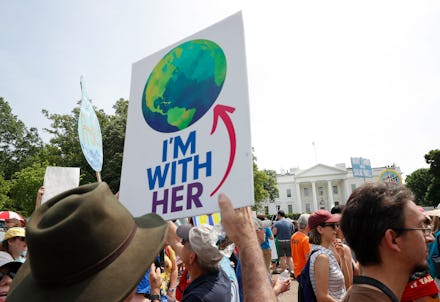How the Trump administration is taking more steps to weaken environmental regulations

The Trump administration has been continuing its assault on the environment in recent weeks, as the executive branch weakens environmental regulations affecting CO2 emissions, wildlife and more.
Trump’s presidency has been filled with sweeping policies that could prove harmful to the environment, from loosening regulations on air pollution to pulling out of the Paris Climate Accord. An essay published in the Journal of the American Medical Association in June projected that the Trump administration’s environmental policies could potentially result in 80,000 additional deaths per decade, as well as respiratory problems for more than 1 million people.
“This sobering statistic captures only a small fraction of the cumulative public health damages associated with the full range of rollbacks and systemic actions proposed by the Trump administration,” Harvard University scientists David Cutler and Francesca Dominici wrote.
Oil conservation and fuel standards
In a recent memo released by the Department of Energy, the Trump administration declared that conserving oil is now no longer an “economic imperative.”
The memo notes that a rise in fracking and domestic oil has reduced the need for imported oil and “in turn affects the need of the nation to conserve energy” — without making any mention of the benefits that conserving energy has on the environment or climate change.
The position is part of the Trump administration’s broader push away from fuel conservation. The Environmental Protection Agency submitted a proposal earlier in August to stop requiring auto manufacturers to make cars more fuel efficient, after former President Barack Obama’s administration imposed new requirements in order to limit greenhouse gas emissions. The proposed rule would freeze an Obama-era requirement for fuel efficiency to average 35 miles per gallon by 2020 for at least five years.
Though the Trump administration has pointed to the economic benefits of relaxed fuel standards, it could come at a cost. The AP reported that the proposed mileage freeze would increase oil consumption by 500,000 barrels per day — which results in more emissions and pollution — and is also projected to increase the number of highway deaths. Vehicle emissions are now the leading source of greenhouse gas emissions in the U.S., with transportation accounting for one-quarter of the country’s emissions contributing to climate change.
Coal emissions
Vehicles soon may not be the only major creator of more greenhouse gas emissions. The Trump administration is expected to release a proposed plan this week that would overhaul the Obama administration’s Clean Power Plan, which would allow states to establish emission standards for coal-fueled power plants and roll back regulations on coal, incentivizing companies to keep coal plants rather than replace them with cleaner forms of energy.
If the proposed rule goes through, CO2 levels would be reduced by between 0.7 and 1.5% from their 2005 levels — as compared with a 19% reduction under the Obama-era plan, the Washington Post reported.
The proposal is part of Trump’s larger push toward coal, which he has championed since his presidential campaign. In addition to pushing for more coal mining jobs, Trump claimed at a recent fundraiser that coal was “indestructible” in a “military way,” as opposed to windmills that could be “blow[n] up ... if the birds don’t kill it first,” according to a transcript published on Twitter by Toronto Star reporter Daniel Dale.
Experts have suggested that Trump’s policies will not actually bring back coal jobs, however, which are already vastly outnumbered by jobs in the clean energy economy. One study predicted that an administration proposal to delay retirement of coal and nuclear power plans would cause one death from increased emissions for every two to 4.5 coal mining jobs that the proposal supports, resulting in an estimated 353-815 premature deaths in 2019-2020.
Endangered species
Humans aren’t the only ones set to be harmed by the Trump administration’s environmental policies. The administration unveiled a proposal in July targeting the Endangered Species Act, which would strip the 45-year-old act of many key provisions.
Though the 36 proposed changes to the ESA include “reasonable bookkeeping” that simply codify practices that were already taking place, an analysis by the Environmental Policy Innovation Center noted there are some reasons for concern. Among the most potentially damaging policy changes are proposals to remove language requiring species to be listed as endangered “without reference to possible economic or other impacts of such determination;” changing how unoccupied habitats are designated as “critical” to a species’ survival — and thus conserved — and withdrawing protections that extend beyond current listed species to protect threatened species that could be added to the endangered species list in the future.
The Trump administration’s actions are part of a broader push to weaken the act by the executive branch, Republicans in Congress and lobbyists, the New York Times reported.
“These proposals would slam a wrecking ball into the most crucial protections for our most endangered wildlife,” Brett Hartl, government affairs director at the Center for Biological Diversity, said in a statement. “If these regulations had been in place in the 1970s, the bald eagle and the gray whale would be extinct today. If they’re finalized now, Zinke will go down in history as the extinction secretary.”
Though the administration’s actions against the environment are damaging — and potentially fatal — groups have been successfully pushing back. The administration’s environmental efforts have been struck down in court seven times since Aug. 9 alone, and state governments and environmental groups alike continue to challenge the administration’s environmental policies.
“Having litigation muscle to fight against what the administration is trying to do has been absolutely essential,” Aaron Colangelo, litigation director at the National Resources Defense Council, told FastCompany in April. “The courts are a bulwark against this administration’s worst attacks on the environment.”